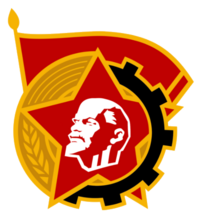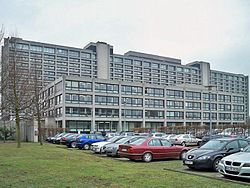Socialist Workers' Party (Liothidia)
 | |
| First Secretary | Georg von Carstein |
| Vice Secretary | Teresa Fehrenbach |
| Founded | 1 May 1908 |
| Headquarters | 12. August Platz, Rahden |
| Student wing | Socialist Students of the Revolution |
| Youth wing | Free Socialist Youth |
| Research wing | Central Party Policy Office |
| Armed wing | People's Revolutionary Army |
| Membership (2017) | |
| Ideology | Popular Socialism Liothidian nationalism |
| Position | Far-left |
| Colours | Red |
| Slogan | Für das Volk ("For the People") |
| Seats in the People's and Workers' Assembly | 475 / 680
|
| Seats in the Central Committee | 27 / 30
|
| Party flag | |
 | |
The Socialist Workers' Party (Liothidian: Sozialistische Arbeiterpartei, SAP), is the founding and ruling political party of the Liothidian Democratic People's Republic. The Socialist Workers' Party is the sole governing party within Liothidia, permitting only highly vetted and subordinated {{wp|independent (politics)|independents]] to co-exist within the national legislature. It was founded in 1908, chiefly by Heinrich Schrader and Gustav Hohenstein. The party grew quickly, and by 1918 had overthrown the Hechenreyt monarchy and established the People's Democratic Republic. It also controls one of the world's largest armed forces, the People's Revolutionary Army.
The SWP is officially organised on the basis of democratic centralism, a principle conceived by Liothidian Wernerist theoretician Heinrich Schrader which entails democratic and open discussion on policy on the condition of unity in upholding the agreed upon policies. Unlike other socialist governing parties, the SWP abolished the alternating bodies of preeminence and installed a fixed structure in 1977. As such the highest body of the SWP is the Central Committee of State, which also forms the nominal executive of Liothidia, while the Central Committee holds all duties and responsibilities of the party.
The party's leader holds the offices of First Secretary (responsible for civilian party duties and head of state) and Secretary of the Revolutionary Defence Commission (responsible for military affairs). Through these posts, the party leader is the country's paramount leader. The current paramount leader is Georg von Carstein, elected at the 10th General Party Congress held in May 2015.
The SWP is committed to communism and continues to participate in the XXXX each year. According to the party constitution, the SWP adheres to Wernerism–Schraderism, Three Pillars of Advancement, Socialist Virtues of the Fatherland, Popular Socialism and Socialism in Modernity. The official explanation for Liothidia's economic reforms is that the country is in the primary stage of socialism, a developmental stage similar to the capitalist mode of production. The command economy established from 1918 until 1970 was replaced by the socialist market economy, the current economic system, comes under Popular Socialism.
History
Governance
Organisation
Central organisation
Lower-level organisations
Members
To join the party, an applicant must be approved by the party, usually through the District Party Administrative Office, the regional level branch of the party apparatus. In 2017, only 1.3million applications were accepted out of some 4 million applicants. Admitted members then spend a year as a probationary member.
Free Socialist Youth
Support organisations
Central Party Office for Solidarity
The Central Party Office for Solidarity is one of the oldest continuing support-units of the SAP. Established in November 1919, it was initially tasked with assisting socialist and communist parties across Belisaria in amassing support, influence and ultimately power.
Central Party Policy Office
Central Party Office for Women's Rights
Central Party Office for Business and Industry
The Central Party Office for Business and Industry (Zentrales Parteiamt für Wirtschaft und Industrie; ZEPWIN) is the party's official body dedicated to consulting with major private businesses over economic and fiscal policy. While many mistake ZEPWIN as the primary party body for dealing with state-owned enterprises, in truth ZEPWIN has been described as the "formal platform for corporate interests within the party-government."
ZEPWIN meets weekly with delegates from the United Congress for Commercial Affairs (VKKA), the nation's chamber of commerce, at these weekly meetings, the delegates will discuss economic trends, market movements and general desires for reform or policy. During these meetings, it is widely accepted that the government is also to express desires and aims to delegates.
During times of economic difficulty, ZEPWIN mediates between the VKKA, the Volksbank, Finance and Industry ministries to formulate systemic policies and responses. These instances and the day-to-day work of ZEPWIN lacks significant transparency and its activities are not explained nor described to the Volksversammlung or any legislative body. Due to this lack of transparency, ZEPWIN has been derided as the as the official means for corporate interests to both be explained and forced upon central government.
